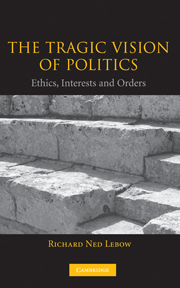Book contents
7 - The wisdom of classical realism
Published online by Cambridge University Press: 22 September 2009
Summary
Many wonders are there, but none is more deinon (wondrous, strange, powerful, awful) than man.
SophoclesChapters 3 through 6 analyzed the writings of Thucydides, Clausewitz and Hans Morgenthau in historical context. Here, I offer a comparative analysis that emphasizes the fundamental unity of classical realism across a span of nearly 2,500 years. It is organized around the themes of order, justice and change, the central dimensions of politics for all three thinkers. Classical realists have holistic understandings of politics that stress the similarities, not the differences, between domestic and international politics, and the role of community in promoting stability in both. They recognize that communal bonds are fragile and easily undermined by the unrestrained pursuit of unilateral advantage by individuals, factions and states. When this happens, time-honored mechanisms of conflict management like alliances and the balance of power may not only fail to preserve the peace but may make domestic and international violence more likely.
The importance of community directs our attention to the ever-present tensions between the interests of the community and those of its members, whether individuals or states. I have already discussed Thucydides' understanding of this polarity, and in this chapter I show the fundamental similarity between his views and those of Clausewitz and Morgenthau. All three classical realists believed that the tensions between individuals and communities could be understood and in part reconciled at a deeper level of understanding.
- Type
- Chapter
- Information
- The Tragic Vision of PoliticsEthics, Interests and Orders, pp. 257 - 309Publisher: Cambridge University PressPrint publication year: 2003



